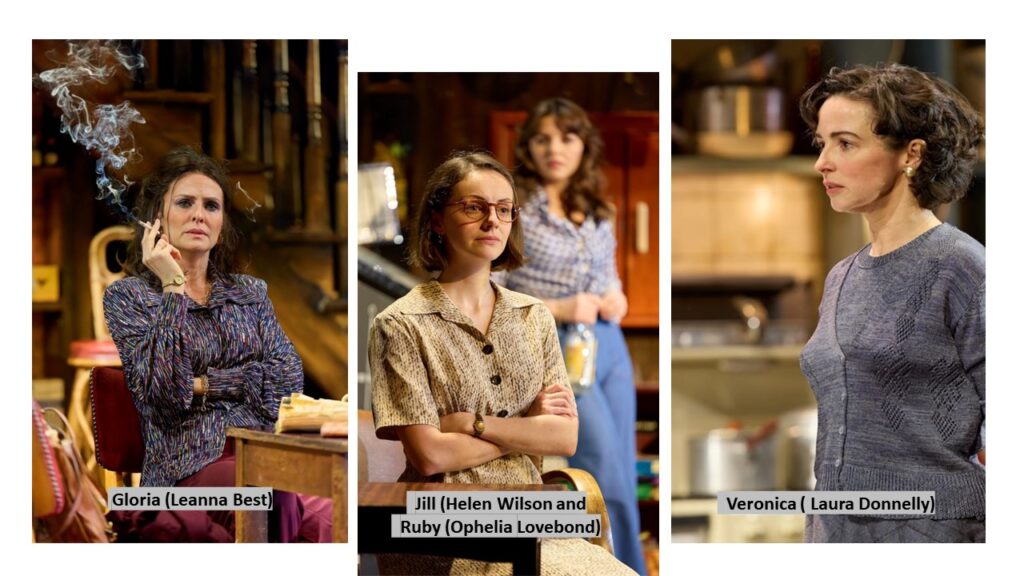Les Butterworth’s The Hills of California is a masterfully crafted play and brilliantly directed by Sam Mendes. It is currently staged at Harold Pinter Theatre.
The scene is set at Seaview Guesthouse, located at the edge of Blackpool, a city buzzing with aspirations and dreams. Despite the guesthouse’s name, ‘you cannot see the sea from any of its windows, not even from the top floor. You can see the car park, the Bingo … If you lean right out you can see the Tower’ the iconic building in the city, inspired by the Eiffel Tower. The rooms in the guesthouse are named after states in the USA.
This play is about big dreams, aspirations, the impatient wait to have them fulfilled, and the eventual price paid to realise even a fraction of these dreams.
It is August 1976, the hottest summer for 200 years.
Three sisters, Jill, Ruby, and Gloria are reunited in their mother’s Guesthouse, waiting for their eldest sister, Joan to arrive. This place had been their home until they flew the nest. Their widowed mother, Veronica Webb, is now lying upstairs, dying of stomach cancer. They gathered to decide on the inevitable issues relating to their mother’s death. We don’t see the sick mother. She is cared for by one of the sisters, Jillian (Helen Wilson), and Penny (Natasha Magigi), a dedicated nurse. Jillian’s puritan-dress-code blends well with the stale furniture of the 1960s. Yet there is a great deal to her than meets the eye.
Ruby (Ophelia Lovebond), attractive, dressed in body-hugging casual top and trousers, inspires confidence and charm. Her dress code is sexy, contrasts with Jill’s. Ruby appears confident in her own skin. The third sister, Gloria (Leanne Best), arrives equipped with volcanic anger that erupts in every direction and at the slightest provocation. Jill’s insistence that they wait for their sister before they call the doctor to relieve their mother’s pain for good, is a cause of a mega eruption. Gloria’s anger is laced with sarcasm and bitterness that goes deep into the family past.

The past unfolds, almost organically by the rotation of the stage to reveal the adjacent private part of the ‘Luxury Guest House’ – the kitchen-dinner family quarter. There we meet Veronica, the young, widowed mother (Laura Donnelly) and her four teen-aged daughters. Performance of the four – Nicola Turner (young Jill), Sophia Ally (young Ruby) Nancy Alisop (young Gloria) and Lara McDonnell young Joan), is excellent. The year is 1955.
Veronica Webb has grit and determination to get her daughters to centre-stage. She is endearingly drawn and projected. She wants the best she knows for her daughters. Donnelly’s performance is a masterclass in acting. She takes centre stage in her tireless efforts to secure her daughters’ stardom. She is obsessively ambitious and didactic, preparing her girls, before, during and after their dinner for auditions. When opportunity comes, the price paid for possible success near the Hills of California, cracks her steel determination.
The play then switches back to 1976 and the wait for Joan to arrive. Gloria cannot swallow her criticism of Joan’s disappearance for 20 years, yet her surprise at the presence of a jukebox, which her mother brought into the guesthouse in the 1960s and her astonishment that the large store near her mother’s guesthouse closed down some 10 years ago expose her own absence from the guesthouse.
Joan, the fourth sister, the one who reached the ‘Hills of California’, eventually arrives. In that role, Laura Donnelly offers yet another outstanding performance. She embodies the price she paid for the glitter, a price that many young ambitious females pay to touch fame. Her metallic gold bomber jacket says it all – not all that glitters is gold.
Butterworth’s play is also about dysfunctional families, child abuse and sexual exploitation and a great deal more.
Every member of the artistic and production team contributes to this impressive production.

